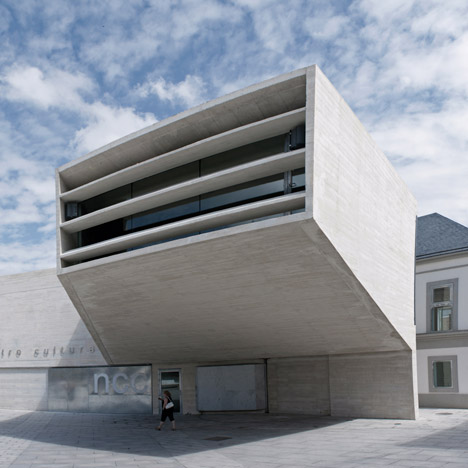The auditorium of this Madrid cultural centre by Spanish studio Fündc is contained in a bulky concrete cantilever.
Located at the heart of a public square, the cast concrete New Cultural Centre (NCC) also contains flexible exhibition rooms and a cafe.
Integrated benches and planters fill the surrounding square, with three floors of underground parking beneath.
Above: photograph by Anna Pericas
More projects in Spain on Dezeen »
More cultural buildings on Dezeen »
Photography is by César García Guerra, apart from where stated.
Here are a few more details from the architects:
Fündc designs a ‘New Historical Centre’ in Madrid
Car and pedestrian. Vegetation and hard square. Modern and classic. This new urban concept bets for all of the above.
Fündc, Spanish architecture and urban planning office, just finalized the largest urban intervention of the last decades made on Pozuelo de Alarcón, Madrid: the New Cultural Center (NCC) and the new pedestrian area on and around Padre Vallet Square. It establishes itself as the origin of the new network of pedestrian spaces.
Above: photograph by P. Gil
The project has a couple of unprecedented design solutions such as ‘mega-tree-pots’ and a transformable hall.
The pots allow for the growth of medium-large trees above an underground parking, making possible green areas where usually just hard squares are found.
The hall allows for an use modification on the cultural building program, as it can switch between exhibition promenade and auditorium mode through the manipulation of movable floor decks.
The built size of the intervention, both under and above ground comes near to 20.000 m2 (65.000 sq. ft.). It consists on the urbanisation through a new uninterrupted stone pavement, fountains and ‘mega-tree-pots’ around a new cultural center building. The latter is composed of two different architectural typologies, old and new, which work on a symbiotic manner providing traditional and transformable spaces.
Under these areas and building a double-deck parking absorbs the vehicle impact working together with underground roads and bus stops, freeing the upper square spaces to pedestrians and bikes.
“This intervention changes the traditional way of understanding new pedestrian areas on built environment as it does not choose between pedestrians or cars but accepts both, re-positioning them.” As explained by architect Cesar Garcia co-author and partner together with Paz Martin of Fündc, office originally established in the Netherlands and relocated to Spain. “No need for road restrictions when you can reposition them underground. No need for lack of parking places as you can multiply them on levels. No need for flat hard public squares when you can grow large trees, necessary for urban comfort on this climate.”
The authors also mention that they would not choose between architectures of the past or the future but accept both. they do not position themselves on an extreme but respect the collective memory and presence of existing buildings in combination with the spatial advantages that more futuristic shapes can provide. A new hybrid typology is thus generated on which each part conforms a symbiotic whole on present time. “We believe necessary to unify opinions, or at least start a discussion, with the NCC, in between the figures of final user and architect”
Click above for larger image
Click above for larger image

